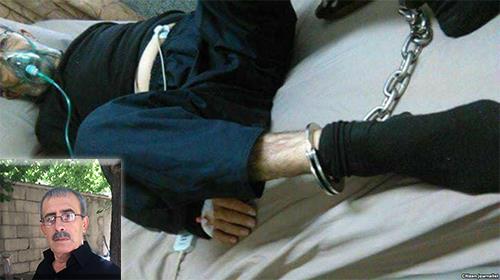Iran: shocking revelation of mass execution by a former intelligence minister + video
Former intellligence minister and one of the perpetrators of the AMIA bombing
IRAN, 17 July 2017-- In an interview with an Iranian regime funded television station, Ali Fallahian, the former Iranian intelligence minister and one of the perpetrators involved in the AMIA bombing that killed 85 people on July 18, 1994 in Buenos Aires, Argentina, revealed the mindset behind the mass execution of more than 30,000 political prisoners in Iran during the summer of 1988.

Mass execution of more than 30,000 political prisoners in 1988 in Iran

The AMIA community centre bombing on July 18, 1994

People holding photographs of the victims of the 1994 AMIA bombing participate at the ceremony to mark the 16th anniversary of this henious act that killed 85 people in Buenos Aires

Argentinian Prosecutor Alberto Nisman Shot Dead befor he had a chance to prove to the court the unquestionable Iran's involvment in AMIA bombing.
This interview was conducted in Farsi language and uploaded on the internet. The following is the exact translation of the interview. The name of the television station conducting the interview is APARAT, but the date is unknown.
TV Presenter: Did all those who were executed [in 1988] were arrested while having fire arms, meaning were they armed rebels?

A 3-man team of judges and ministers was assigned to oversee these cases and release those who were eligible and execute those who were not.
Fallahian: No, not all of them were armed rebels, but most of those who were arrested lived in team houses. When we would arrive at these houses, we could only find may be one or two weapons and those who were arrested in the streets didn't even carry guns.
TV presenter: Then, would you call this armed rebellious?
Fallahian: They were part of that organization [PMOI]
TV presenter: Even thought that they were arrested only having a newspaper?
Fallahian: Yes, they were part of the [PMOI] organization. That means they were ready to do any operation, though be it that, one would just buy bread for people in that house or another one just doing the maintenance.
TV presenter: Even thought that they were arrested only having a newspaper?
Fallahian: Yes, they were part of the [PMOI] organization. That means they were ready to do any operation, though be it that, one would just buy bread for people in that house or another one just doing the maintenance.
TV presenter: Even if they are not operational units and just the advertising units?
Fallahian: Yes, of course, they are part of this group. An operational unit which fights must have everything, not just the weapon. They must have logistics and backups.
TV presenter: wouldn't they be considered as captives?
Fallahian: No. Imam [Khomeini] said you must execute those who are steadfast in their beliefs. We couldn't let them go and couldn't keep them in jail. If we had kept them in jail, we would have a bunch of people over our head telling us don’t keep them in jail. So a 3-man team of judges and ministers was assigned to oversee these cases and release those who were eligible and execute those that were not.

A site of mass graves of some of the political prisoners executed in the summer of 1988
TV presenter: another word, the principal point was to execute all prisoners, except those who were eligible for parole?
Fallahian: they were supposed to check and see and talk to the prisoners to find out if they still adhere to their beliefs.
TV presenter: What was the criterion for gauging who is steadfast and who is not?
Fallahian: to say that I believe in the PMOI and don't believe in you.
TV presenter: this is nuts?
Fallahian: yes, they were nuts.
TV presenter: Where was Mr. Montazeri?
Fallahian: Mr. Montazeri had a different case. He had a disagreement with the Imam [Khomeini]. Mr. Montazeri believed, and some others also believed, that killing and executing so many would haunt us and the history would judge against us and Islam. He believed that we shouldn't do that (executing the prisoners). Later in time, the enemy would use this against us. But Imam said don’t worry about the history, do according to the religious and don't worry about the history.

Mr. Montazeri believed, and some others also believed, that killing and executing so many would haunt us and the history would judge against us and Islam
In another part of this interview, Fallahian revealed that Iran's intelligent agents work under cover in different countries.
Fallahian: the intelligence ministry of every country is like that, may be a little less, but it's about the same. The ministry needs cover for its works to collect information both inside the country and outside. It is obvious that we don’t send an agent to Germany or America and for example say, ok, I am an agent of the information ministry and I am here to collect information, please give that to me. Obviously, he would work under the cover of business or other jobs including reporters. You know many of our reporters are actually ministry agents.
TV presenter: Well, we are not.
Fallahian: Reporting doesn't bring any money.
TV presenter: But the honor and honesty of the pen are more than everything.
Fallahian: Yes, I agree, but agents need cover, being an agent of information ministry is also an honorable job.




Comments
Post a Comment